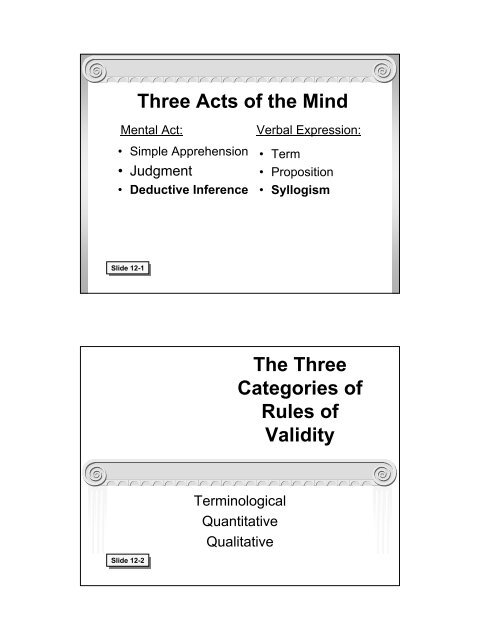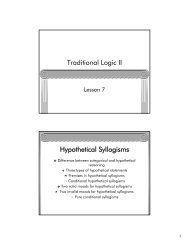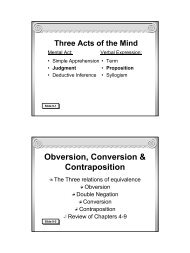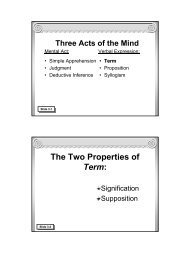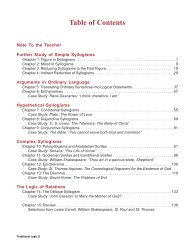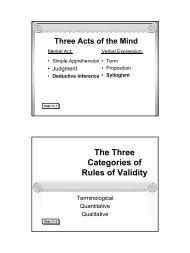Traditional Logic I Chapter XII - Memoria Press
Traditional Logic I Chapter XII - Memoria Press
Traditional Logic I Chapter XII - Memoria Press
You also want an ePaper? Increase the reach of your titles
YUMPU automatically turns print PDFs into web optimized ePapers that Google loves.
Three Acts of the Mind<br />
Mental Act:<br />
• Simple Apprehension<br />
• Judgment<br />
• Deductive Inference<br />
Verbal Expression:<br />
• Term<br />
• Proposition<br />
• Syllogism<br />
Slide 12-1<br />
The Three<br />
Categories of<br />
Rules of<br />
Validity<br />
Terminological<br />
Quantitative<br />
Qualitative<br />
Slide 12-2
Quantitative<br />
Rules of<br />
Validity<br />
III. If a term is distributed in the<br />
conclusion, then it must be<br />
distributed in the premises.<br />
IV. The middle term must be<br />
distributed at least once.<br />
Slide 12-3<br />
Quantitative<br />
Rules<br />
These two rules are quantitative<br />
because they have to do with the<br />
quantity of the statements in the<br />
syllogism. (Universal or Particular)<br />
Slide 12-4
Rule III: If a term is distributed<br />
in the conclusion, then it must<br />
be distributed in the premises.<br />
Slide 12-5<br />
This rule prevents<br />
us from trying to say<br />
more in the<br />
conclusion than is<br />
justified by the<br />
premises.<br />
The Definition<br />
of<br />
Distribution<br />
Distribution is the status of a<br />
term in regard to extension.<br />
Slide 12-6
Diagram of the<br />
Distribution of<br />
Terms<br />
Type of Sentence Subject-Term Predicate-Term<br />
A<br />
I<br />
E<br />
O<br />
Distributed<br />
Undistributed<br />
Distributed<br />
Undistributed<br />
Undistributed<br />
Undistributed<br />
Distributed<br />
Distributed<br />
Slide 12-7<br />
Application of<br />
Rule III<br />
All angels Md are spiritual beings Pu<br />
No men Sd are angels Md<br />
Therefore, no men Sd are spiritual beings Pd<br />
Slide 12-8
The Fallacy of Illicit Process<br />
Slide 12-9<br />
This fallacy is committed<br />
when the extension of a<br />
term is greater in the<br />
conclusion than in the<br />
premises. In other<br />
words, the conclusion<br />
says more than is<br />
justified by the premises.<br />
Two kinds of<br />
Fallacy of Illicit<br />
Process<br />
The Fallacy of Illicit Major<br />
The Fallacy of Illicit Minor<br />
Slide 12-10
The Fallacy of Illicit Major<br />
Slide 12-11<br />
This fallacy is committed<br />
when the major term has<br />
greater extension in the<br />
conclusion than in the<br />
premises—i.e. when the<br />
major term is distributed<br />
in the conclusion but not<br />
the premises.<br />
The Fallacy of Illicit Major<br />
All angels Md are spiritual beings Pu<br />
No men Sd are angels Md<br />
Therefore, no men Sd are spiritual beings Pd<br />
Slide 12-12
Slide 12-13<br />
Possibility #2<br />
(premises true &<br />
conclusion false:<br />
Possibility #1<br />
(premises true&<br />
conclusion true):<br />
Spiritual<br />
Beings<br />
Spiritual<br />
Beings<br />
Angels<br />
Men<br />
Angels<br />
Men<br />
All angels Md are spiritual beings Pu<br />
No men Sd are angels Md<br />
Therefore, no men Sd are<br />
spiritual beings Pd<br />
The Fallacy of Illicit Minor<br />
Slide 12-14<br />
This fallacy is<br />
committed when the<br />
minor term has<br />
greater extension in<br />
the conclusion than in<br />
the premises—i.e.<br />
when the minor term<br />
is distributed in the<br />
conclusion but not the<br />
premises.
The Fallacy of Illicit Minor<br />
All men Md are animals Pu<br />
All men Md are mortal Su<br />
Therefore, all mortals Sd are animals Pu<br />
Slide 12-15<br />
Possibility #1<br />
Slide 12-16<br />
(premises true&<br />
conclusion true):<br />
Possibility #2<br />
(premises true &<br />
conclusion false):<br />
Mortals<br />
Animals<br />
Mortal<br />
Men<br />
Animals<br />
Men<br />
All men Md are animals Pu<br />
All men Md are mortal Su<br />
Therefore, all mortals Sd are<br />
animals Pu
Quantitative<br />
Rules of<br />
Validity<br />
III. If a term is distributed in the<br />
conclusion, then it must be<br />
distributed in the premises.<br />
IV. The middle term must be<br />
distributed at least once.<br />
Slide 12-17<br />
Rule IV: The middle term must<br />
be distributed at least once<br />
Slide 12-18<br />
An undistributed middle<br />
term cannot connect<br />
the minor and major<br />
terms together, since<br />
at least one of either<br />
the minor or major<br />
term will refer to all of<br />
a particular thing.
Rule IV: The middle term must<br />
be distributed at least once<br />
All angels Pd are spiritual beings Mu<br />
All men Sd are spiritual beings Mu<br />
Therefore, all men Sd are angels Pu<br />
Slide 12-19<br />
Slide 12-20<br />
Possibility #2<br />
(premises true &<br />
conclusion false:<br />
Possibility #1<br />
(premises true&<br />
conclusion true):<br />
Spiritual Beings<br />
Spiritual Beings<br />
Angels<br />
Angels<br />
Men<br />
Men<br />
All angels Pd are spiritual beings Mu<br />
All men Sd are spiritual beings Mu<br />
Therefore, all men Sd are angels Pu
Quantitative<br />
Rules of<br />
Validity<br />
III. If a term is distributed in the<br />
conclusion, then it must be<br />
distributed in the premises.<br />
IV. The middle term must be<br />
distributed at least once.<br />
Slide 12-21


